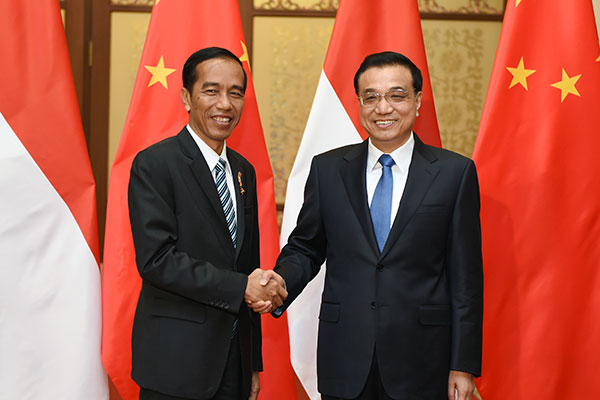
Premier Li Keqiang meets with Indonesian President Joko Widodo in Beijing on March 27, 2015.[Photo by Liu Zhen/China News Service]
Premier Li Keqiang has presented the idea of capacity cooperation as his new business card, in addition to his renowned salesmanship for promoting high-speed railways and other Chinese equipment internationally, during his recent meetings with many foreign leaders who came to attend the 2015 Boao Forum for Asia.
Li told visiting Indonesian President Joko Widodo on March 27 that China and Indonesia, both populous countries with huge market potential, should cooperate further by introducing Beijing’s advanced spare capacity in pushing forward Jakarta’s infrastructure construction.
Earlier, Li spoke with Armenian President Serzh Sargsyan on March 26, saying that China is ready to correspond to the new development plan for Armenia and embark on cooperation in fields that include railways, motorways, nuclear power and electricity, as China has accumulated rich experiences in the construction of infrastructure, with cost-effective equipment.
Sargsyan said he welcomes Chinese enterprises coming to Armenia for investing, participating in infrastructure construction in areas such as motorways, nuclear power and electricity and the mining sector.
Armenia places hope on its cooperation with China in regard to production capacity to boost its economic and social development, he added.
On the same day, Li told Sri Lankan President Maithripala Sirisena that China is willing to further encourage Chinese enterprises to invest in and flourish in Sri Lanka, participate in the construction of infrastructure and major industrial projects, help Sri Lankan promote its industrialization and boost local development and employment.
China’s attempt to export its industrial capacity to overseas countries has recorded another success on March 27 with landmark deals worth $23.6 billion being signed with Kazakhstan to help restructure the Central Asian country’s economy.
Premier Li and visiting Kazakh Prime Minster Karim Masimov agreed on wide-ranging industrial cooperation after holding talks in Beijing, including the construction of highways, urban rails, hydropower plants, wind power plants and other infrastructure facilities, in addition to commercial deals on automobile and elevation manufacturing.
Deals signed on March 27 are the first part being harvested from a preliminary consensus of exporting China’s advanced industrial capacity to the Central Asian economy that the two leaders have agreed to during Li’s visit to Kazakhstan in last December.
Earlier, the Premier, in talks with Widodo at the Great Hall of the People, said China encourages more qualified and established companies to invest in Indonesia in projects such as high-speed rail, light rail and industrial parks located near ports.
Widodo said Indonesia, with a huge demand for infrastructure and establishment of industrial parks, hopes to strengthen cooperation with China.
Indonesia welcomes Chinese companies to invest in infrastructure facilities such as high-speed rail and electricity as well as industrial park construction, he said.
The Indonesian president also noted Jakarta’s support for the establishment of the Asian Infrastructure Investment Bank.
When addressing the Indonesia-China Economic Cooperation Forum, Li also noted the idea of attracting foreign investment, which is complementary to the strategy of pushing capacity cooperation abroad.
He stressed that China is still the largest developing country in the world, which needs to draw foreign investment and import high technologies to further develop its industries.
Citing the fact that China was the country with the most foreign investment in 2014, Li said, “we welcome foreign enterprises to invest in China.”
